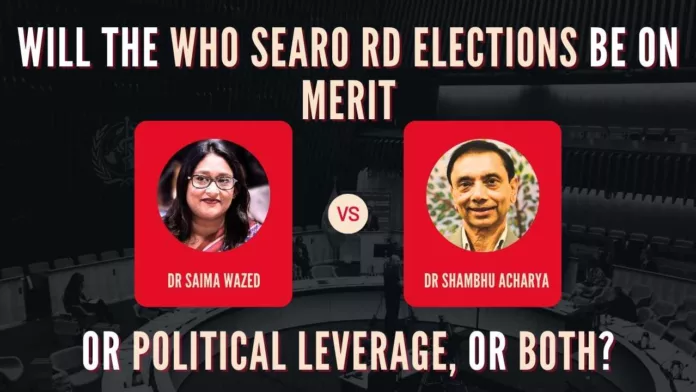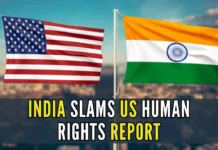
Fight for WHO SEARO RD heats up between Bangladesh and Nepal
Over 27 years of my professional career which took me to five continents, from developed to developing countries, regions bested by conflict to regions enjoying relative peace, what stood out for me when observing individuals performing leadership roles very successfully with the Multilateral Agencies at Headquarters Level and Country level are:
- There is no alternative to ground/ field experience.
- Previous experience of assimilation and understanding of working in a multi-cultural, multi-lingual environment
- The ability to demonstrate the power of collective thinking and be able to influence a scalable country strategy.
In a nutshell, it is about the ability to influence, listen, be humble, and yet be assertive. It requires diplomatic skills to navigate but at the core of spirit and conduct is the ability to remain focused on the development agenda.
In the recent case of elections to the WHO – SEARO Regional Director (RD) position, a series of actions, events, meetings, and writings have emerged which have provided us with lessons aplenty to reiterate the requisites for this important role.
This is not the first time an International Agency is electing an official from a Member State. It is quite a normal activity in International Affairs. Besides the assessment of skills, knowledge, and experience, there is no denying that contesting Member States do engage in advocacy and lobbying for their candidate, however, in a subtle and behind-the-scenes manner while the candidates share their insightful articles in the public domain. Dialogue and Diplomacy play a key role ahead of the final vote.
However, the WHO-SEARO RD position seems to have taken an unfriendly, unprincipled, and unprofessional turn. Every recruitment has an underlying Code of Ethics that governs the process. That ethical conduct has been dimmed along the way.
It began with Bangladeshi Candidate Dr Saima Wazed’s flashing selfie with the World’s Influential Leaders at the G20 Leadership Platform in New Delhi and in the United States. It raised brows in Nepal and consequently sent ripples across social media. Interestingly, Dr Acharya remained calm and composed with no reactions. He instead opted to counter the flashy campaign by demonstrating his acumen at dealing with pressing health problems by writing a very incisive article on matters relating to our health in a media based out of Nepal. The article was constructively received.
Irked by Bangladesh starting to promote Dr Wazed’s candidature through the government’s social media channels, Nepali Civil Society Leaders and International Health Experts shared their positive testimonials about Dr Acharya. After that, Dr Wazed also started to share her insights on health in public writings.
It did not end there. International and Nepali Media published articles about Dr. Saima Wazed’s campaign strategy and questioned whether her candidature is a factor of political connections or meritocracy. Dr Wazed took to Social Media counter-critique by saying that she is being attacked because she is a woman. In my view that was a weak counterargument as one could have demonstrated strength as a leader and a professional and countered the critic, if required on professional merits.
In another recent public appearance, Foreign Minister Momen of Bangladesh in an interview with “The Hindu” called out for Nepal’s Dr Acharya to withdraw his candidature. While support for one’s own Bangladeshi candidate is natural but to go all the way out in a public statement against an international candidate as well a current senior professional at the WHO like the stature of Dr Acharya is more likely to be read as one out of inherent pressure of Dr Wazed’s clout in domestic politics rather than her professional capabilities. In global development, there is no space for such remarks in any multilateral agency and certainly discredits Dr Wazed’s candidature more than anyone else’s. It was reasonable to expect Dr Wazed to issue a follow-up statement showing her high morality and values to disassociate from FM Momen’s remarks against Dr Acharya and reinstate commitment to the Code of Ethics and trust in international agency’s rules and procedures for fair elections. International leaders must act inclusive and balanced all the time.
A section in Nepali media and civil society went on a different trajectory of showcasing Dr Acharya as a technically qualified candidate but potentially falling short of garnering the support from India, one of the eleven Member States that votes. They even blamed their own government for a lack of diplomatic savviness to pursue Dr Acharya’s candidature. Such statements could result in more moral harm to their own candidate as well as to Nepal’s own relations with its strategic neighbour, India. Instead of leveraging support from the civilizational and time-tested friend India, a section of Nepali media taking an unwarranted dig on India may weaken Dr. Acharya’s candidacy from a number perspective, India’s vote in the election stands equal to vote among other members entitled to vote for the Regional Director. However, India’s growing influence in international affairs, especially after the outstanding success of #G20IndiaSummit cannot be overlooked. Over the recent years, India-Bangladesh has worked in tandem and there is no denying that friendship requires effort and commitment. While Nepal-India relations are also moving in sync but to see narratives being spread against India’s potential vote in Nepali media dents friendship more than strengthening it.
Instead of showcasing Dr Acharya’s rock-solid experience of three decades with WHO in international health issues and policy priorities, Nepal’s non-state actors’ questioning India’s role is a weak strategy to support Dr Acharya’s candidature.
Hopefully, the WHO members will rise above the social media promotion and demotion of candidates. Instead, the members should reenergize their focus on the merits of the candidates. The role of Regional Director must be assumed by a person who has demonstrated leadership skills and who is hands-on with health challenges, opportunities, and policy matters in the region. Dr Acharya’s experience started with fieldwork in family planning in Nepal and evolved over the last 30 years across the length and breadth of the health ecosystem at the WHO. Because of his in-depth experience, he is serving in a critical role as WHO-Director Country Strategy and Support and influencing country strategies of 152 countries. There is no doubt that his incredible experience and WHO leadership capabilities stand out.
Any development professional will reiterate that elections shall be fair, independent, and follow a just process which is what I personally experienced at the multilateral agencies. I also extend my best wishes to both the candidates, namely, Dr Saima Wazed, Psychologist, Autism Activist, and Health Advisor from Bangladesh, and Dr Shambhu P Acharya, Ph.D. in Public Health and serving presently as the Director Country Strategy and Support, WHO.
Both Bangladesh and Nepal are dear to India and South Asia. Himalayas to the Bay of Bengal connectivity can only be accelerated through mutual trust and friendship and treating the region as one. Such uneasy discourses for elections will not make us emerge stronger and more inclusive.
Note:
1. Text in Blue points to additional data on the topic.
2. The views expressed here are those of the author and do not necessarily represent or reflect the views of PGurus.
For all the latest updates, download PGurus App.
- Will the WHO SEARO RD elections be on merit or political leverage, or both? - October 24, 2023
- Canada’s Appeasement Policy – A landmine - October 22, 2023










